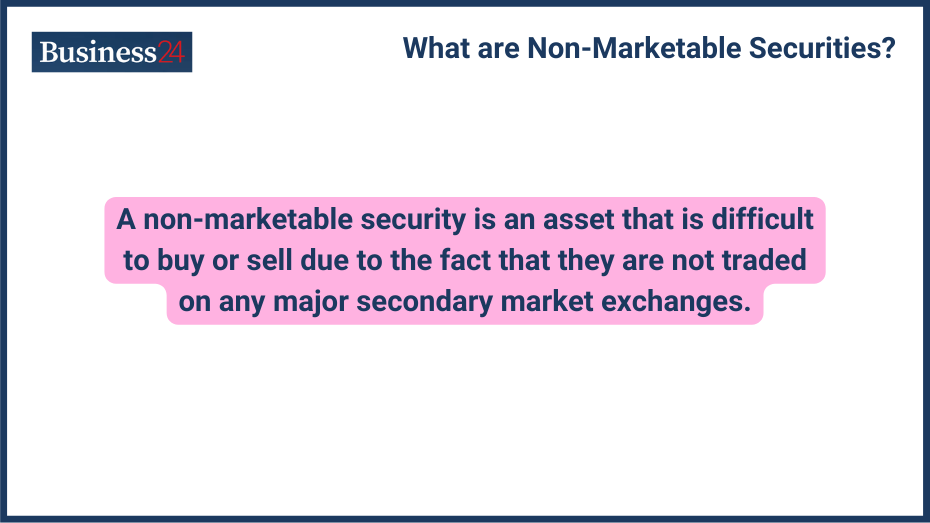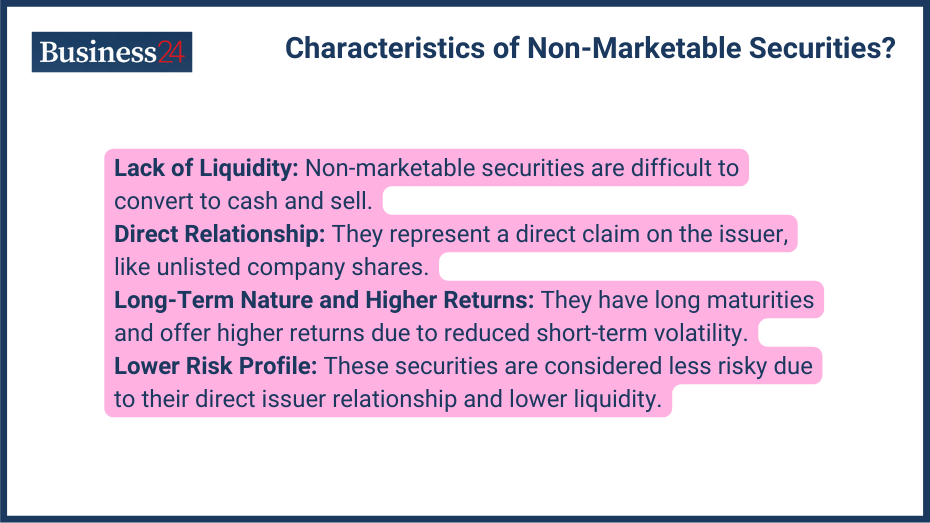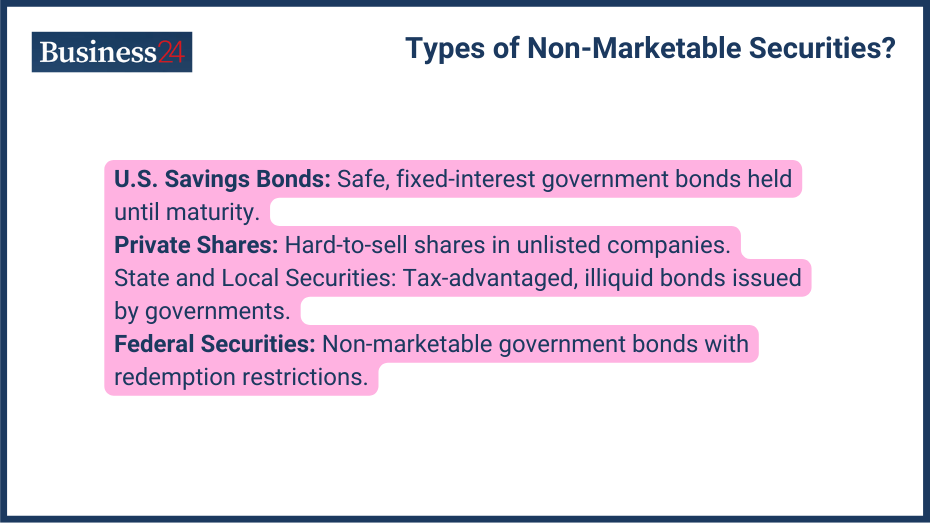
A non-marketable security is an asset that is difficult to buy or sell due to the fact that they are not traded on any major secondary market exchanges.
Non-marketable securities are financial instruments that cannot be easily bought or sold in a public market. While assets like stocks, bonds, or mutual funds can be easily accessed in the secondary market and used for trading or investing, non-marketable securities are not readily available in the market because they are not listed in any exchange, and thats makes it hard to buy or sell.
There are various kinds of assets and securities, each with different characteristics and features. Lack of liquidity is a key characteristic that differentiates non-marketable securities from marketable securities.
What are the Characteristics of Non-Marketable Securities?

Characteristics of non-marketable securities:
- Lack of Liquidity: The biggest characteristic, or we can say a problem, is that non-marketable securities are much less liquid. These securities cannot be easily converted into cash through a public market, and investors cannot easily sell them to other investors.
- Direct Relationship: Non-marketable securities typically represent a direct claim on the issuer, such as a government or a corporation. One example is an unlisted company giving its employees shares, which are hard to liquidate until the company lists in an exchange.
- Long-Term Nature and Higher Returns: These securities often have long maturities; you cannot execute them in the short term. Also, due to their long-term nature, they are not affected by short-term fluctuations, which results in higher returns for investors or holders.
- Lower Risk Profile: Due to their direct relationship with the issuer and the lack of liquidity, non-marketable securities are often considered less risky than marketable securities. However, this can vary depending on the specific security and issuer.
What are examples of marketable securities?
Marketable securities, on the other hand, are easily available in the market to buy or sell for any purpose. Examples of marketable securities include listed stocks, which can be easily traded on a stock exchange. Bonds and ETFs are also easily tradeable.
What are the Types of Non-Marketable Securities?

Types of non-marketable securities:
U.S. Savings Bonds
U.S. Savings Bonds are a popular type of non-marketable security issued by the U.S. government. They cannot be resold and must be held until maturity. Because they are issued by the government, U.S. Savings bonds are considered a safe and low-risk investment option. They offer a fixed interest rate and can be purchased in various denominations.
Private Shares and Private Company Stock
Another major example of non-marketable securities is private shares and private company stocks. Sometimes, companies provide employees with shares to compensate them, and if the company is unlisted, it is very hard to liquidate those shares until the company does an IPO. Also, some investors with bigger return expectations buy shares of unlisted companies, but until the company is listed on an exchange, these shares are very hard to sell.
State and Local Government Securities
Wherever state and local government needs to raise money, they issue securities. These securities offer tax advantages for investors, but they also have limited liquidity. Examples include municipal bonds and state-issued savings bonds.
Federal Government Securities
Not all securities issued by the Federal government are non-marketable, like treasury bonds. Like state and local governments, the Federal government also issues securities to finance non-marketable public projects. For example, savings bond programs offered by the U.S. government have restrictions on early redemption, limiting their marketability.
What are the Advantages and Disadvantages of Non-Marketable Securities?
Advantages of Non-Marketable Securities
- Stability and Security: Non-marketable securities, especially those issued by governments, are often considered relatively safe investments with a lower risk of default. Because of their long-term holdings, investments in non-marketable securities are safe and can yield better results.
- Fixed Interest Rates: Many non-marketable securities offer fixed interest rates, like non-marketable securities issued by local or federal governments. You have to wait for maturity, but you can expect fixed interest rates from them.
- Tax Benefits: Some non-marketable securities, such as U.S. savings bonds, offer tax advantages. Thus, you can earn a return on your investment and enjoy the tax benefits provided by these securities.
Disadvantages of Non-Marketable Securities
- Lack of Liquidity: The biggest problem with non-marketable securities is their inability to easily sell, which creates challenges for investors who need to access their funds quickly. Sometimes, they can become worthless if the company goes bankrupt because there will be no buyers.
- Limited Marketability: Finding buyers for non-marketable securities can be difficult if the company is not fundamentally good or growing. This can be time-consuming and cause the security to lose its value over time.
What is the Comparison with Marketable Securities?
Liquidity: The primary comparison is liquidity. Marketable securities, such as TESLA stock, are tradeable in various stock exchanges and can be bought or sold in any exchange, but non-marketable securities, like private equity or some bonds, are not listed anywhere, and it is really hard to buy or sell them until they are very famous and investors are looking for them to invest in.
Price Determination: The prices of marketable securities are determined by market forces. The number of buyers and sellers or demand and supply decides the price. While the concept of demand and supply doesn’t work on non-marketable securities, the issuer typically fixes the prices of non-marketable securities.
Risk and Return: While risk and return are not fixed, both can give different returns, more or less, according to different situations. However, non-marketable securities, if issued from growth and good fundamental companies, can give a greater return than marketable securities because of their longevity and stability from short-term price fluctuations.
What are the Situations Where Non-Marketable Securities Are Preferred?
Non-marketable securities might be preferred in the following situations:
- Investors are seeking a low-risk investment with a stable company and growth potential.
- Individuals with a long-term investment horizon and no immediate need for liquidity.
- Investors seek tax advantages offered by certain non-marketable securities.
- Employees can choose equity or private equity as salary compensation if the company is fundamentally strong.
Investing in Non-Marketable Securities
Investing in non-marketable securities requires a different approach than investing in marketable securities. You have to go through every detail while investing in non-marketable securities, and a lot of information may also not be available to them.
How to Purchase Non-Marketable Securities?
You cannot buy non-marketable securities in an exchange or any other market; you have to purchase directly from the issuer or through authorized financial institutions. You have to go through various paperwork and documents. Also, non-marketable securities are not easily available, so it is hard for a retail investor to purchase non-marketable. But if you are a high net-worth investor, you can get a chance to buy such securities.
What are the Holding Period Requirements?
There aren’t fixed holding period requirements because there are different kinds of non-marketable securities. Equity provided by companies to employees has different lock-in periods; sometimes, employees cannot sell their holdings until a company gets listed in an exchange. Some non-marketable securities, like U.S. savings bonds, have specific holding period requirements before you can sell them.
What are the Tax Considerations?
The tax implications of investing in non-marketable securities can vary depending on the specific type of security and the investor’s tax situation. It’s essential to consult with a tax advisor to understand the tax consequences of your investment.
What are the Risk Factors Associated with Non-Marketable Securities?
While there are many benefits of non-marketable securities, there are various risks associated with them:
What is Inflation Risk?
Many non-marketable securities offer a fixed rate of return over a period of time, but inflation can increase in the meantime, affecting the investment return. Other opportunities can give you more return than the inflation rate. Due to inflation, the purchasing power of your investment will erode over time due to rising prices.
What is Interest Rate Risk?
Interest rate risk is the potential for the value of your investment to fluctuate due to changes in interest rates. While non-marketable securities are generally less sensitive to interest rate fluctuations compared to marketable bonds, some types of non-marketable securities, such as those with longer maturities, can still be affected. If interest rates rise, the value of your existing non-marketable securities with fixed interest rates might decline.
What is Default Risk?
Sometimes, companies don’t sustain for a long time, and their share can become worthless. Default risk is the chance that the issuer of a non-marketable security won’t meet its financial obligations, like making interest payments or repaying the principal. Government-issued non-marketable securities are usually seen as low-risk, but interest rates and inflation can affect them.
What are the Regulatory Aspects of Non-Marketable Securities?
Non-marketable securities are subject to various regulatory frameworks depending on the issuer and the type of security. Regulatory bodies of some famous non-marketable securities:
- U.S. Savings Bonds: Regulated by the U.S. Department of the Treasury.
- State and Local Government Securities: Subject to regulations of the respective state or local government.
- Private Shares: Governed by securities laws and regulations of the jurisdiction where the company is incorporated.
Governing bodies usually decide the compliance requirements of non-marketable securities.
Issuers of non-marketable securities must comply with relevant regulations, such as disclosure requirements, investor protection rules, and tax reporting obligations. Investors should also be aware of their own tax obligations related to holding and potentially redeeming non-marketable securities.
What are the Case Studies and Examples?
One major example of non-marketable securities is U.S. savings bonds. These bonds have an average 4% rate of return over time and have generally offered a stable and predictable return over time, providing a safe investment option for many investors. While their interest rate can fluctuate, U.S. savings bonds are considered conservative investments.
Startups provide employees with shares, such as private shares. Recently, Several Nvidia employees have amassed significant wealth through employee stock options (ESOPs) and stock grants. These options have benefited greatly from Nvidia’s soaring stock price, especially as the company’s GPU chips remain in high demand for AI development. So, there are risks associated with the company losing business, but rewards are also bigger with private shares.
Is a 401k a non-marketable security?
No, a 401 (k) is not a non-marketable security. A 401(k) itself isn’t a security; it’s a type of retirement account that holds different securities. Marketable securities can include mutual funds in your 401(k). Usually, you shouldn’t sell the securities in your 401(k) before age 59 ½ because you might face an early withdrawal penalty.
FAQs
Q. Can I sell non-marketable securities?
- Generally, non-marketable securities cannot be easily sold on a public exchange. However, some exceptions exist, such as certain types of savings bonds that can be redeemed early with penalties.
Q. Are non-marketable securities safe investments?
- While non-marketable securities, especially those issued by governments, are often considered relatively safe, they are not entirely risk-free. Factors like inflation, interest rate fluctuations, and issuer creditworthiness can impact their value.
Q. What are the tax implications of non-marketable securities?
- The tax treatment of non-marketable securities varies depending on the specific type of security and your tax situation. It’s essential to consult with a tax professional for guidance.
Q. Can I use non-marketable securities as collateral for a loan?
- Due to their lack of liquidity, non-marketable securities cannot usually be used as collateral for a loan.
Misconceptions and Clarifications
- Non-marketable securities are worthless: This is a misconception. While they might not have a readily determinable market value, they still represent a claim on the issuer and can generate income or be redeemed at maturity.
- All non-marketable securities are low-risk: While many non-marketable securities are considered low-risk, this is not always the case. The risk level can vary depending on the issuer and the specific terms of the security.
- Non-marketable securities are suitable for all investors: Non-marketable securities are generally better suited for investors with a long-term investment horizon and a lower tolerance for risk. They might not be ideal for investors who need quick access to their funds.
Conclusion
Non-marketable securities present a unique investment landscape with both pros and cons. They offer stability and security, but you should consider their lack of liquidity and potential returns compared to marketable securities. Understanding the different types of non-marketable securities, their characteristics, and the associated risks is crucial for making any investment decision.
Disclaimer
eToro is a multi-asset platform which offers both investing in stocks and cryptoassets, as well as trading CFDs.
Please note that CFDs are complex instruments and come with a high risk of losing money rapidly due to leverage. 51% of retail investor accounts lose money when trading CFDs with this provider. You should consider whether you understand how CFDs work, and whether you can afford to take the high risk of losing your money
This communication is intended for information and educational purposes only and should not be considered investment advice or investment recommendation. Past performance is not an indication of future results.
Copy Trading does not amount to investment advice. The value of your investments may go up or down. Your capital is at risk.
Don’t invest unless you’re prepared to lose all the money you invest. This is a high-risk investment and you should not expect to be protected if something goes wrong. Take 2 mins to learn more
eToro USA LLC does not offer CFDs and makes no representation and assumes no liability as to the accuracy or completeness of the content of this publication, which has been prepared by our partner utilizing publicly available non-entity specific information about eToro.
